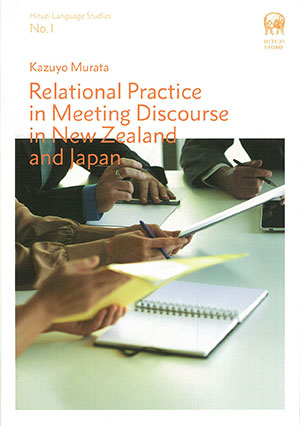Relational Practice in Meeting Discourse in New Zealand and Japan
村田和代著
2015年2月
 |
Hituzi Language Studies No.1
Relational Practice in Meeting Discourse in New Zealand and Japan
村田和代著 Kazuyo Murata
菊判上製 定価6,000円+税
ISBN 978-4-89476-739-3
ブックデザイン 白井敬尚形成事務所
ひつじ書房
|
日本とニュージーランドのビジネスの場での
実際の談話に基づいた初の職場談話研究の書
本書は、ビジネス・ミーティング談話を社会言語学の観点から分析した実証的研究である。日本およびニュージーランドでの談話におけるRelational Practice (対人関係機能面に関わる相互行為)、とりわけ、ユーモアとスモールトークを焦点に表出の特徴を明らかにし、異文化間コミュニケーションにおけるそれらの使用の評価を分析する。実際のミーティング談話に基づいた言語研究として待望の一冊。
村田和代氏の日本とニュージーランドのビジネス・ミーティングにみられるrelational talkの異文化間比較研究は、英語圏での研究が主であった職場談話研究の分野に偉大なる貢献をしている。
本研究においては、ユーモアとスモールトークがミーティングでどのように用いられているかだけではなく、それらがどのように受け取られているかといった側面にも着目した点に特色がある。本書は、異文化コミュニケーション、語用論、社会言語学、職場談話研究といった分野の研究者に有効である。
-----Janet Holmes&Meredith Marra(Victoria University of Wellington)
Contents
Preface
Acknowledegments
chapter 1 Introduction
1.1 Rationale for the research
1.2 Purpose of the research
1.3 Structure of the book
chapter 2 Literature review: politeness theory
2.1 Politeness theory overview
2.1.1 Traditional approach
2.1.2 Modified B&L approach
2.1.3 Post-modern approach
2.1.4 Neo-Politeness approach
2.2 Politeness in workplace discourse
2.2.1 Relational Practice
2.2.2 Communities of Practice
2.3 Politeness from Japanese perspectives
2.4 Cross-cultural considerations
2.4.1 Politeness and culture
2.4.2 Etic and emic dimensions in a cross-cultural study
2.5 Summary
chapter 3 Methodology
3.1 Data collection in the field of workplace discourse
3.2 Methodological design of meeting data
3.3 Meeting data collection in New Zealand: the Language in the Workplace Project
3.4 Meeting data collection in Japan
3.4.1 Preparation
3.4.2 Collecting data
3.4.3 Coding and processing data
3.5 Summary of the meeting dataset
3.6 Methodological design and the collection of perception data
3.7 Ethical considerations
3.8 Summary
chapter 4 Meetings
4.1 Meetings
4.2 Formal meetings(kaigi) and informal meetings(uchiawase/miitingu)
4.3 Meetings in Japanese
4.4 Meetings from a relational perspective
4.5 Structures
4.5.1 Macro structures
4.5.2 Micro structures (topic progressions)
4.6 Meetings in this study
4.6.1 Meetings at company N
4.6.2 Meetings at company J
4.7 Structural characteristics of formal/informal meetings
4.7.1 Formal meetings
4.7.2 Informal meetings
4.8 Summary
chapter 5 Small talk
5.1 Approaches to small talk
5.1.1 Classic approach
5.1.2 Discursive approach
5.1.3 Negotiative approach
5.2 Small talk in workplace discourse
5.2.1 Definition
5.2.2 Distribution
5.2.3 Topics
5.2.4 Functions
5.3 Small talk from Asian perspectives
5.4 Small talk and silence
5.5 Analysis of small talk
5.5.1 Small talk in formal meetings
5.5.2 Small talk in informal meetings
5.5.3 Target participants’ linguistic behaviours regarding small talk
5.6 Summary
chapter 6 Humour
6.1 Humour
6.2 Workplace humour
6.2.1 Definition
6.2.2 Classification
6.2.3 Distribution
6.2.4 Function
6.2.5 Workplace humour and culture
6.3 Responses to humour and laughter
6.4 Analysis of humour
6.4.1 Humour in formal meetings
6.4.2 Humour in informal meetings
6.4.3 Discussion
6.5 Emic perspective
6.5.1 Target participants’ linguistic behaviours regarding Relational Practice
6.5.2 Interpreting the results from an emic perspective
6.6 Summary
chapter 7 Perception task
7.1 Classic method for assessing language attitude from hearers’ perspectives
7.2 Assessing participants’ perceptions in authentic interaction
7.3 Assessing third party’s perception: extended focus group interviews
7.4 Perception task
7.4.1 Overview
7.4.2 Participants
7.4.3 Video-clips and target discourse features
7.4.4 Procedures
7.5 Analysis
7.5.1 Japanese business professionals’ perceptions about Rela tional Practice in New Zealand business meetings
7.5.2 What influences participants’ perceptions
7.6 Summary
chapter 8 Conclusion
8.1 Major findings
8.1.1 Formal meetings vs. informal meetings
8.1.2 Manifestations of small talk and humour
8.1.3 Perceptions of small talk and humour
8.2 Research contribution
8.2.1 Contribution to research on meetings and on workplace interaction
8.2.2 Contribution to politeness research
8.2.3 Contribution to cross-cultural and inter-cultural research
8.3 Future research
Appendix
References
Index
|
著者紹介
Kazuyo Murata 村田和代(むらた かずよ)
2001年奈良女子大学大学院人間文化研究科博士課程単位取得退学。2011年ニュージーランド国立ヴィクトリア大学大学院言語学科Ph.D. (言語学)。龍谷大学法学部講師、准教授を経て、龍谷大学政策学部教授。
|
|
ご注文は、最寄りの書店さんでお願いします。
お店に在庫が無くても、お取り寄せができます。
書店が最寄りにない場合は、オンライン書店でご注文ください。




お急ぎの場合は、小社あてにご注文いただくこともできます。
郵便番号、ご住所、お吊前、お電話番号をメールか、FAXでお知らせください。
送料432円でお送りします。

